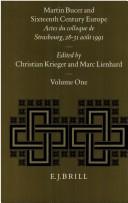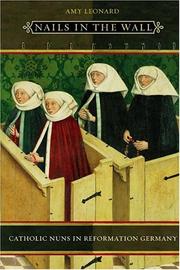| Listing 1 - 10 of 37 | << page >> |
Sort by
|
Book
ISBN: 9789004164055 Year: 2008 Publisher: Leiden Brill
Abstract | Keywords | Export | Availability | Bookmark
 Loading...
Loading...Choose an application
- Reference Manager
- EndNote
- RefWorks (Direct export to RefWorks)
Protestantism --- Strasbourg (France) --- Strasbourg (France) --- Church history --- Church history
Book
Year: 1982
Abstract | Keywords | Export | Availability | Bookmark
 Loading...
Loading...Choose an application
- Reference Manager
- EndNote
- RefWorks (Direct export to RefWorks)
Printing --- -History --- Strasbourg (France) --- -Strasbourg (France) --- -Imprints --- Intellectual life
Book
Year: 1967 Publisher: New Haven : Yale University Press,
Abstract | Keywords | Export | Availability | Bookmark
 Loading...
Loading...Choose an application
- Reference Manager
- EndNote
- RefWorks (Direct export to RefWorks)
Book
ISBN: 1282397907 9786612397905 9047432444 9789047432449 9781282397903 661239790X 9789004164055 9004164057 Year: 2008 Publisher: Leiden ; Boston : Brill,
Abstract | Keywords | Export | Availability | Bookmark
 Loading...
Loading...Choose an application
- Reference Manager
- EndNote
- RefWorks (Direct export to RefWorks)
Recent scholarship has criticized the assumption that European modernity was inherently secular. Yet, we remain poorly informed about religion's fate in the nineteenth-century big city, the very crucible of the modern condition. Drawing on extensive archival research and investigations into Protestant ecclesiastical organization, church-state relations, liturgy, pastoral care, associational life, and interconfessional relations, this study of Strasbourg following Germany's annexation of Alsace-Lorraine in 1871 shows how urbanization not only challenged the churches, but spurred them to develop new, forward-looking, indeed, urban understandings of religious community and piety. The work provides new insights into what it meant for Imperial Germany to identify itself as 'Protestant' and it provocatively identifies the European big city as an agent for sacralization, and not just secularization.
Book
Year: 1967 Volume: 87 Publisher: New Haven : Yale University Press,
Abstract | Keywords | Export | Availability | Bookmark
 Loading...
Loading...Choose an application
- Reference Manager
- EndNote
- RefWorks (Direct export to RefWorks)
Reformation --- Strasbourg (France) --- Church history --- Histoire religieuse
Book
ISBN: 9004532277 Year: 1993 Publisher: Leiden ; Boston : Brill,
Abstract | Keywords | Export | Availability | Bookmark
 Loading...
Loading...Choose an application
- Reference Manager
- EndNote
- RefWorks (Direct export to RefWorks)
This two-volume work describes the significant activities of Martin Bucer, reformer in Strasbourg, and the profound influence he exerted on his contemporaries. The collection brings together sixty contributions in English, German and French by leading Bucer and sixteenth century scholars. They highlight Bucer's profile and style, his theology, his attitude towards social questions of his time, his work in the church, his relationships with contemporaries in the city of Strasbourg and all over Europe, his position on contemporary issues and how his peers perceived him — in short, the many facets of thought, actions, and influence of an important but largely neglected sixteenth century reformer. They also provide new insight into the victories and defeats of Protestantism, and on Bucer's role in the progress of the Reformation in Europe. Dieses Buch stellt das Wirken und die vielfältigen Beziehungen des Strassburger Reformators Martin Bucer dar. Sechzig Beiträge prominenter Spezialisten Bucers und des 16. Jahrhunderts sind in den zwei Bänden vereint. Behandelt werden Bucers Profil und Stil, seine Theologie, seine Haltung zu gesellschaftlichen Fragen seiner Zeit, sein Wirken in der Kirche, seine Beziehungen zu Zeitgenossen in Strassburg und in ganz Europa, seine Verhältnis zu zeitgenössischen Strömungen, die Rezeption Bucers. Die verschiedenen Beiträge erhellen auf vielfältige Weise das Denken, das Wirken und die Austrahlung eines der grossen aber weithin vergessenen Reformators des 16. Jahrhunderts. Sie werfen auch ein neues Licht auf die Siege und Niederlagen der evangelischen Bewegung und die Rolle Bucers bei der Durchführung der Reformation in Europa. The print edition is available as a set of two volumes (9789004098862).
Church history. --- Reformation --- Strasbourg (France) --- Church history

ISBN: 9004098860 9004097988 9004098852 Year: 1993 Publisher: Leiden ; New York ; Köln E.J. Brill
Abstract | Keywords | Export | Availability | Bookmark
 Loading...
Loading...Choose an application
- Reference Manager
- EndNote
- RefWorks (Direct export to RefWorks)
Bucer, Martin --- Congresses --- Reformation --- France --- Strasbourg (France) --- Congresses --- Strasbourg (France) --- Church history --- Congresses
Book
ISBN: 0801894123 9780801894121 Year: 2009 Publisher: Baltimore Johns Hopkins university press
Abstract | Keywords | Export | Availability | Bookmark
 Loading...
Loading...Choose an application
- Reference Manager
- EndNote
- RefWorks (Direct export to RefWorks)
Missionaries, medical --- Musicians --- Theologicans --- Europe --- Schweitzer, Albert, --- Strasbourg (France)

ISBN: 0226472574 Year: 2005 Publisher: Chicago University of Chicago press
Abstract | Keywords | Export | Availability | Bookmark
 Loading...
Loading...Choose an application
- Reference Manager
- EndNote
- RefWorks (Direct export to RefWorks)
Dominican nuns --- Reformation --- Germany --- Strasbourg (France) --- Church history
Book
ISBN: 0674416295 0674416287 Year: 2014 Publisher: Cambridge, MA : Harvard University Press,
Abstract | Keywords | Export | Availability | Bookmark
 Loading...
Loading...Choose an application
- Reference Manager
- EndNote
- RefWorks (Direct export to RefWorks)
When war broke out between France and Prussia in the summer of 1870, one of the first targets of the invading German armies was Strasbourg. From August 15 to September 27, Prussian forces bombarded this border city, killing hundreds of citizens, wounding thousands more, and destroying many historic buildings and landmarks. For six terror-filled weeks, "the city at the crossroads" became the epicenter of a new kind of warfare whose indiscriminate violence shocked contemporaries and led to debates over the wartime protection of civilians. The Siege of Strasbourg recovers the forgotten history of this crisis and the experiences of civilians who survived it. Rachel Chrastil shows that many of the defining features of "total war," usually thought to be a twentieth-century phenomenon, characterized the siege. Deploying a modern tactic that traumatized city-dwellers, the Germans purposefully shelled nonmilitary targets. But an unintended consequence was that outsiders were prompted to act. Intervention by the Swiss on behalf of Strasbourg's beleaguered citizens was a transformative moment: the first example of wartime international humanitarian aid intended for civilians. Weaving firsthand accounts of suffering and resilience through her narrative, Chrastil examines the myriad ethical questions surrounding what is "legal" in war and what rights civilians trapped in a war zone possess. The implications of the siege of Strasbourg far exceed their local context, to inform the dilemmas that haunt our own age--in which collateral damage and humanitarian intervention have become a crucial part of our strategic vocabulary.
Military art and science --- History. --- Siege (Strasbourg, France : 1870) --- Franco-Prussian War --- 1870 - 1871 --- Strasbourg (France) --- History
| Listing 1 - 10 of 37 | << page >> |
Sort by
|

 Search
Search Feedback
Feedback About UniCat
About UniCat  Help
Help News
News